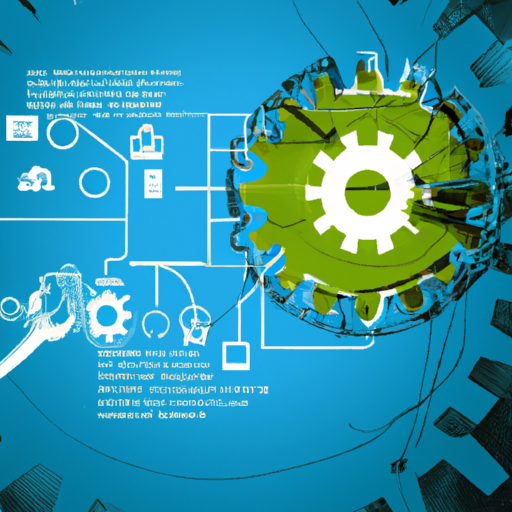Can MSPs Assist With E-commerce Platform Management?
In today’s digital age, managing an e-commerce platform can be a challenging task. From ensuring smooth website functionality to optimizing user experience, the demands can become overwhelming. However, there is a solution that may alleviate some of these burdens — Managed Service Providers (MSPs). These knowledgeable professionals have the expertise and resources to support and enhance your e-commerce platform, allowing you to focus on growing your online business. So, can MSPs really assist with e-commerce platform management? Let’s explore the possibilities.
Benefits of Using MSPs for E-commerce Platform Management
Managing an e-commerce platform can be a challenging task, but with the help of Managed Services Providers (MSPs), it becomes much easier. MSPs offer a wide range of benefits that can help businesses excel in the competitive world of e-commerce.
Expertise in E-commerce Platforms
One of the primary benefits of using MSPs for e-commerce platform management is their expertise in various e-commerce platforms. MSPs have a deep understanding of popular platforms like Magento, Shopify, and WooCommerce, allowing them to provide valuable insights and guidance on platform selection and configuration.
With their extensive knowledge, MSPs can help businesses choose the right platform that aligns with their specific needs and goals. They can also assist in setting up and customizing the platform to optimize its performance and ensure a seamless user experience.
24/7 Monitoring and Support
E-commerce platforms need constant monitoring to ensure they are operating smoothly and effectively. MSPs offer round-the-clock monitoring and support, allowing businesses to focus on their core operations while leaving the technical aspects to the experts.
MSPs can quickly identify and resolve any issues that arise, preventing potential downtime and loss of revenue. Their proactive approach to monitoring ensures that any potential problems are addressed before they escalate into major issues, providing businesses with peace of mind and uninterrupted operations.
Improved Performance and Scalability
Performance and scalability are crucial aspects of any e-commerce platform. With the help of MSPs, businesses can achieve optimized performance and seamless scalability.
MSPs have the expertise to fine-tune the platform’s performance, ensuring fast loading times and smooth navigation. They can also assist in implementing load balancing techniques and setting up a content delivery network (CDN) to improve site speed and handle increased traffic.
Additionally, MSPs can easily scale the platform as the business grows, accommodating higher volumes of traffic and transactions without compromising performance. This scalability ensures that businesses can handle increased demand during peak seasons or promotional campaigns without any issues.
Enhanced Security Measures
E-commerce platforms are prime targets for cyberattacks, making security a top priority. MSPs play a vital role in enhancing security measures to protect businesses and their customers’ sensitive information.
With regular security audits and vulnerability assessments, MSPs can identify potential security risks and implement appropriate measures to mitigate them. They can configure firewalls and intrusion detection systems, implement data encryption, and ensure compliance with industry standards such as the Payment Card Industry Data Security Standard (PCI DSS).
MSPs also manage user access control, ensuring that only authorized individuals have access to critical systems and data. By providing enhanced security measures, MSPs help businesses build trust with their customers and protect their valuable reputation.
Cost Efficiency
Outsourcing e-commerce platform management to MSPs can lead to significant cost savings for businesses. By partnering with MSPs, businesses can avoid the need to invest in expensive infrastructure, software licenses, and hiring dedicated IT personnel.
MSPs offer flexible pricing models, allowing businesses to pay for only the services they need. This scalability eliminates the need for upfront capital investment and allows businesses to align their IT expenses with their actual usage.
Moreover, MSPs can provide cost-effective solutions through their expertise and economies of scale. Their experience in managing multiple e-commerce platforms allows them to optimize resources and implement efficient processes, ultimately reducing operating costs for businesses.
Challenges of E-commerce Platform Management
While the benefits of using MSPs for e-commerce platform management are evident, it is important to understand the challenges that businesses may face in this area. By recognizing these challenges, businesses can better appreciate the value that MSPs bring to the table.
Complexity of E-commerce Platforms
E-commerce platforms can be complex, with various features and functionalities that require careful configuration and customization. Managing these complexities can be a daunting task for businesses without the necessary expertise.
MSPs offer a solution to this challenge by bringing their in-depth knowledge of e-commerce platforms to the table. They are well-versed in the intricacies of different platforms and can navigate through the complexities with ease. By leveraging their expertise, businesses can streamline their platform management and ensure optimal performance.
Security Vulnerabilities
The increasing frequency of cyberattacks and the sophistication of hackers pose a significant challenge for businesses managing e-commerce platforms. Security vulnerabilities can expose sensitive customer information and lead to reputational damage.
MSPs play a critical role in mitigating security risks by implementing robust security measures. They stay up to date with the latest security threats and trends, ensuring that businesses’ e-commerce platforms are protected from potential attacks. By relying on MSPs for security management, businesses can focus on their core operations with confidence.
Performance and Scalability Issues
E-commerce platforms need to deliver high-performance experiences to users, especially during peak periods of activity. Slow loading times and performance issues can lead to frustrated customers and lost sales opportunities.
MSPs can help overcome these challenges by optimizing the performance of e-commerce platforms. Through load balancing, caching techniques, and database optimization, MSPs ensure that platforms can handle increased traffic without compromising performance. Their ability to scale platforms seamlessly enables businesses to grow without worrying about performance constraints.
Limited IT Resources
For many businesses, maintaining an in-house IT team with the necessary expertise in e-commerce platforms can be financially and logistically challenging. Limited IT resources can hinder their ability to effectively manage and optimize their e-commerce platforms.
MSPs offer a solution to this challenge by providing businesses with access to a dedicated team of experts. These experts have extensive knowledge and experience in managing e-commerce platforms, allowing businesses to leverage their expertise without the need for a full-time in-house team. This flexibility enables businesses to focus their resources on core competencies while leaving platform management to the experts.
Rapidly Evolving Technology
The technology landscape is constantly evolving, presenting businesses with the challenge of keeping up with new trends and advancements in e-commerce platform management. Staying updated requires continuous learning and investment in training and development initiatives.
MSPs help businesses overcome this challenge by staying at the forefront of technology and industry trends. They invest in staying up to date with the latest advancements, ensuring that businesses’ e-commerce platforms are equipped with the most current features and functionalities. By partnering with MSPs, businesses can harness the power of evolving technology without the burden of continuous learning and adaptation.
Key Responsibilities of MSPs in E-commerce Platform Management
When it comes to e-commerce platform management, MSPs take on various key responsibilities to ensure the smooth operation and optimal performance of the platforms. These responsibilities encompass a range of tasks that help businesses achieve their e-commerce goals effectively.
Platform Selection and Configuration
One of the essential tasks of MSPs is assisting businesses in selecting the right e-commerce platform for their specific needs. With their in-depth knowledge of various platforms, MSPs can analyze businesses’ requirements and provide recommendations on the most suitable options.
Once a platform is chosen, MSPs take charge of its configuration and customization. They work closely with businesses to understand their branding and functional requirements, setting up the platform accordingly. MSPs ensure that the platform is optimized for performance, user experience, and business objectives.
Platform Monitoring and Maintenance
Continuous monitoring and maintenance are critical for ensuring the optimal performance and uptime of e-commerce platforms. MSPs provide 24/7 monitoring, ensuring that any issues or anomalies are identified and addressed promptly.
MSPs conduct regular maintenance tasks such as applying updates and patches to keep the platform secure and up to date. They also perform periodic audits and checks to ensure that the platform is running smoothly and efficiently. Their vigilance in monitoring and maintenance prevents potential issues from causing disruption to businesses’ e-commerce operations.
Performance Optimization
MSPs play a vital role in optimizing the performance of e-commerce platforms. They analyze the platform’s performance metrics and identify areas for improvement. With their expertise, they implement techniques like load balancing, caching, and database optimization to enhance the platform’s speed and responsiveness.
Moreover, MSPs conduct code reviews and performance enhancements to optimize the platform’s overall performance. By constantly monitoring and fine-tuning the platform’s performance, MSPs ensure that businesses can deliver a seamless and high-performing e-commerce experience to their customers.
Security Management
Ensuring the security of e-commerce platforms is a paramount responsibility for MSPs. They conduct regular security audits and vulnerability assessments to identify potential risks. MSPs configure firewalls, intrusion detection systems, and implement data encryption and other security measures to protect businesses and their customers from cyber threats.
MSPs also help businesses comply with industry standards such as PCI DSS, which are essential for handling sensitive customer information securely. Their comprehensive security management approach provides businesses with peace of mind and instills trust in their customers.
Integration with External Systems
E-commerce platforms often need to integrate with external systems to streamline business operations. MSPs facilitate this integration by working closely with businesses to understand their integration requirements. They leverage their technical expertise to seamlessly integrate e-commerce platforms with systems such as third-party APIs, payment gateways, inventory and order management systems, and customer relationship management (CRM) platforms.
By integrating these systems, MSPs ensure that businesses can automate processes, improve efficiency, and enhance the overall customer experience. MSPs play a crucial role in reducing manual work and enabling seamless data flow between different systems.
Choosing the Right MSP for E-commerce Platform Management
Selecting the right MSP for e-commerce platform management is crucial for achieving desired outcomes and a successful partnership. To choose the right MSP, businesses need to consider several important factors.
Assessing E-commerce Expertise
When evaluating MSPs, it is essential to assess their expertise in managing e-commerce platforms. Businesses should look for MSPs with a proven track record of success and experience with platforms relevant to their industry and business model. Assessing the MSP’s knowledge and understanding of e-commerce platforms ensures that they can provide the guidance and support needed for effective platform management.
Evaluating Support and Monitoring Capabilities
Support and monitoring are critical aspects of e-commerce platform management. Businesses should evaluate the MSP’s support capabilities, including response times and availability. 24/7 support is particularly essential for e-commerce operations that must be up and running at all times.
Additionally, businesses should inquire about the MSP’s monitoring capabilities, including the frequency of monitoring, the range of metrics monitored, and the proactive measures in place to ensure continuous operation. A comprehensive support and monitoring framework is vital for minimizing downtime and resolving issues promptly.
Scalability and Flexibility
Businesses should consider the scalability and flexibility provided by the MSP. As business needs evolve and grow, the MSP should be able to scale the platform accordingly and accommodate increased traffic and transaction volumes. The MSP should also offer flexible pricing models that align with businesses’ evolving requirements.
Security Practices and Certifications
Security is of utmost importance in e-commerce platform management. Businesses should assess the MSP’s security practices and certifications to ensure they meet industry standards. Compliance with regulations like PCI DSS is a significant consideration, as it demonstrates the MSP’s commitment to protecting sensitive customer information.
Cost and Contractual Terms
Finally, businesses should evaluate the cost structure and contractual terms offered by the MSP. The pricing should be competitive and transparent, with no hidden costs. Businesses should also review the terms of the service level agreement (SLA), ensuring that it covers critical aspects such as performance guarantees, response times, and dispute resolution mechanisms.
By carefully evaluating these factors, businesses can choose an MSP that meets their specific needs and provides reliable support for their e-commerce platform management.
Factors to Consider Before Outsourcing E-commerce Platform Management
Outsourcing e-commerce platform management can be a strategic decision, but it requires careful consideration of several factors. Before deciding to outsource, businesses should assess their needs and capabilities to ensure that outsourcing is the right choice for them.
Business Size and Growth Potential
The size of the business and its growth potential are important factors to consider. Smaller businesses may benefit from outsourcing, as it allows them to leverage the expertise of MSPs without the need for significant upfront investments. For larger businesses, outsourcing can free up internal resources to focus on strategic initiatives and core competencies.
Businesses with high growth potential should also consider outsourcing, as it enables them to scale their e-commerce operations seamlessly. MSPs can handle increasing traffic and transaction volumes, allowing businesses to focus on driving growth without worrying about platform limitations.
In-house IT Skills and Resources
Assessing in-house IT skills and resources is crucial to determine whether outsourcing is necessary. Businesses lacking the necessary expertise and resources to effectively manage e-commerce platforms may find it more beneficial to outsource to MSPs. Outsourcing allows businesses to access a dedicated team of experts without the cost and effort of hiring and retaining full-time employees.
Alternatively, if a business has a capable in-house IT team, they may choose to manage the e-commerce platform internally. However, businesses should be mindful of the additional workload on their IT team and the potential diversion of resources from core business activities.
Budget and Cost Analysis
Budget considerations are a significant factor when deciding whether to outsource e-commerce platform management. Businesses should conduct a cost analysis to determine the total cost of ownership (TCO) of managing the platform internally versus outsourcing to MSPs.
In addition to direct costs, businesses should account for indirect costs such as training, infrastructure, and ongoing updates and maintenance. Comparing these costs with the pricing offered by MSPs allows businesses to make an informed decision based on the cost efficiency of outsourcing.
Security and Compliance Requirements
Cybersecurity and data protection are critical considerations for businesses managing e-commerce platforms. If a business lacks the expertise and resources to ensure robust security and compliance measures internally, outsourcing to MSPs can provide an added layer of protection.
MSPs specialize in implementing security measures and ensuring regulatory compliance, helping businesses meet industry standards such as PCI DSS. By outsourcing, businesses can benefit from the expertise of MSPs, ensuring that their e-commerce platforms are secure and compliant.
Strategic Focus and Core Competencies
Lastly, businesses should consider their strategic focus and core competencies when deciding to outsource platform management. If platform management is not a core competency and does not align with the strategic focus of the business, outsourcing can free up internal resources to focus on areas that drive business growth and innovation.
Outsourcing platform management allows businesses to leverage the expertise of MSPs, who specialize in e-commerce platforms, while aligning internal resources with strategic priorities.
Benefits of MSPs in Platform Selection and Configuration
Choosing the right e-commerce platform is crucial for the success of businesses in the online marketplace. MSPs offer several benefits when it comes to platform selection and configuration, helping businesses make informed choices and optimize their platforms.
In-depth Knowledge of E-commerce Platforms
MSPs have extensive knowledge and experience in working with various e-commerce platforms. They stay updated with the latest trends and advancements, allowing them to provide valuable insights and guidance in platform selection.
By leveraging their in-depth knowledge, MSPs can understand businesses’ unique requirements and recommend the most suitable platforms. They consider factors such as scalability, customization capabilities, integration options, and user experience to ensure the chosen platform aligns with businesses’ needs and goals.
Optimal Configuration and Customization
Configuring and customizing an e-commerce platform can be a complex and time-consuming process. MSPs streamline this process by leveraging their expertise in platform configuration and customization.
MSPs work closely with businesses to understand their branding and functional requirements, setting up the platform accordingly. They ensure that the platform is optimized for performance, user experience, and business objectives. MSPs also assist in customizing the platform to align with businesses’ unique offerings and value propositions.
Integration with Existing Systems
Many businesses already have existing systems in place, such as inventory management, order fulfillment, and customer support systems. Integration between these systems and the chosen e-commerce platform is essential for streamlining operations and ensuring data consistency.
MSPs facilitate seamless integration between e-commerce platforms and existing systems. They have the technical expertise to identify the most effective integration methods and implement them successfully. By integrating these systems, businesses can automate processes, eliminate manual work, and provide a seamless experience to their customers.
Migration Assistance
For businesses already operating on an existing e-commerce platform, migrating to a new platform can be a challenging endeavor. MSPs provide migration assistance to ease the transition process and minimize disruptions to business operations.
MSPs handle the migration process, ensuring that data, product catalogs, customer information, and other relevant information are seamlessly transferred to the new platform. They implement migration strategies that minimize downtime and ensure data integrity. With the assistance of MSPs, businesses can smoothly transition to a new platform without impacting their day-to-day operations.
User-friendly Interface Design
User experience is a vital aspect of e-commerce success. MSPs focus not only on the technical aspects of platform management but also on the user interface (UI) and user experience (UX) design.
MSPs work closely with businesses to design an intuitive and user-friendly interface for their e-commerce platforms. They consider usability, navigation, and visual design to ensure that the platform delivers an excellent user experience. By collaborating with MSPs, businesses can create platforms that are visually appealing, easy to navigate, and optimized for conversions.
Importance of Platform Monitoring and Maintenance by MSPs
Continuous monitoring and maintenance are critical for the optimal performance and uptime of e-commerce platforms. MSPs play a crucial role in ensuring that businesses’ e-commerce platforms operate smoothly and effectively.
Continuous Performance Monitoring
To maintain high performance and minimize downtime, MSPs provide continuous performance monitoring. They leverage monitoring tools and software to track the platform’s key performance metrics, such as response times, page load speeds, and server uptime.
By monitoring performance, MSPs can identify any potential bottlenecks or performance issues and take proactive measures to mitigate them. This proactive approach ensures that businesses’ e-commerce platforms consistently deliver a fast and reliable user experience.
Proactive Issue Identification and Resolution
MSPs take a proactive approach to identify and resolve issues before they impact business operations. Through continuous monitoring, they can quickly detect and diagnose any potential problems, such as server errors, database issues, or security vulnerabilities.
Once an issue is identified, MSPs work diligently to resolve it promptly. Their expertise enables them to apply the necessary fixes, workarounds, or optimizations to ensure that the platform remains stable and performs optimally.
Regular Updates and Patch Management
E-commerce platforms require regular updates and patches to address security vulnerabilities, add new features, and improve performance. MSPs take charge of the update and patch management process, ensuring that the platform is kept up to date with the latest software versions.
By applying updates and patches in a timely manner, MSPs mitigate the risk of security vulnerabilities and ensure that businesses’ e-commerce platforms are equipped with the latest features and enhancements. Regular updates and patches also contribute to improved performance and stability.
Data Backup and Disaster Recovery
Data loss can be catastrophic for businesses operating e-commerce platforms. MSPs ensure that businesses’ critical data is backed up and can be quickly recovered in the event of a disaster.
MSPs implement robust backup and disaster recovery strategies, ensuring that data is securely backed up at regular intervals. They also conduct periodic data recovery drills to validate the effectiveness of the backup and recovery processes. By leveraging the expertise of MSPs in data backup and recovery, businesses can safeguard their valuable data and minimize the risk of data loss.
Ongoing Platform Maintenance
E-commerce platforms require ongoing maintenance to ensure their optimal performance. MSPs take care of the day-to-day platform maintenance tasks, freeing up businesses’ internal resources for strategic initiatives.
MSPs conduct routine maintenance tasks such as database optimization, clearing cache, and optimizing server configurations. These maintenance activities improve the performance and stability of the platform, ensuring that businesses’ e-commerce operations run smoothly.
Through continuous monitoring and proactive maintenance, MSPs help businesses maximize the uptime, performance, and security of their e-commerce platforms. By entrusting platform monitoring and maintenance to MSPs, businesses can focus on core operations and growth without the worry of technical issues and downtime.
MSPs’ Role in Performance Optimization for E-commerce Platforms
Performance optimization is a critical aspect of e-commerce platform management. MSPs play an important role in optimizing the performance of e-commerce platforms, ensuring fast loading times, smooth navigation, and an overall excellent user experience.
Load Balancing and Scalability Planning
E-commerce platforms often experience fluctuations in traffic, especially during peak periods. MSPs address this challenge by implementing load balancing techniques and scalability planning.
MSPs configure load balancers to distribute traffic evenly across multiple servers, preventing any single server from becoming overloaded. Load balancing ensures that the platform can handle high volumes of traffic without degradation in performance. Additionally, MSPs create scalability plans that outline the actions to be taken during sudden increases in demand, allowing businesses to seamlessly accommodate more users and transactions.
Caching and Content Delivery Network Setup
MSPs optimize e-commerce platforms by implementing caching techniques and setting up a Content Delivery Network (CDN). Caching involves storing frequently accessed data or files closer to the user, eliminating the need for repeated requests to the server.
By configuring caching properly, MSPs improve the platform’s loading times and reduce the strain on the server. MSPs also set up CDNs, which store static content on servers distributed across various global locations. CDNs ensure faster delivery of content by serving it from the server closest to the user’s location.
These performance optimization techniques enhance user experience, as users can access content quickly and efficiently. MSPs navigate the complexities of caching and CDN configuration, ensuring that businesses’ e-commerce platforms achieve optimal performance.
Database Optimization
The database is a critical component of any e-commerce platform. To achieve optimal performance, MSPs focus on database optimization.
MSPs analyze the database structure and query performance, identifying bottlenecks and ways to improve efficiency. They optimize the database schema, fine-tune queries, and implement indexing strategies to speed up data retrieval and processing. Additionally, MSPs implement backup and recovery mechanisms to safeguard the integrity and availability of the database.
By optimizing the database, MSPs enhance the platform’s overall performance, ensuring that users can access, search, and retrieve data quickly and seamlessly.
Code Review and Performance Enhancements
MSPs conduct code reviews to identify any performance-related issues in the platform’s codebase. They analyze the codebase for inefficiencies, scalability concerns, and potential bottlenecks.
Based on the findings of code reviews, MSPs suggest and implement performance enhancements. This may involve refactoring the code, optimizing algorithms, or using caching mechanisms to improve performance. MSPs ensure that the platform’s codebase is efficient, scalable, and optimized for optimal performance.
Conversion Rate Optimization
Conversion rate optimization (CRO) is the process of maximizing the number of visitors who complete desired actions on an e-commerce platform, such as making a purchase. MSPs play a significant role in CRO by identifying and implementing strategies to improve conversion rates.
MSPs analyze user behavior, conduct A/B testing, and make data-driven decisions to enhance the platform’s conversion rates. They optimize the user experience, streamline the checkout process, and implement features such as product recommendations and personalized offers. By continuously monitoring and optimizing the platform for conversions, MSPs help businesses maximize revenue and drive success in the e-commerce space.
Security Management by MSPs in E-commerce Platform Management
Ensuring the security of e-commerce platforms is a top priority for businesses. MSPs take on a key role in security management, implementing comprehensive measures to protect businesses and their customers’ sensitive information.
Regular Security Audits and Vulnerability Assessments
MSPs conduct regular security audits and vulnerability assessments to identify potential risks and weaknesses in e-commerce platforms. By performing comprehensive audits, MSPs can proactively address any security vulnerabilities, ensuring that businesses’ platforms are secure.
Vulnerability assessments involve scanning the platform for known vulnerabilities and potential security gaps. Based on the assessment findings, MSPs recommend and implement appropriate security measures to mitigate the identified risks. Regular security audits and vulnerability assessments provide businesses with a proactive approach to staying ahead of potential security threats.
Firewall and Intrusion Detection System Configurations
MSPs configure firewalls and intrusion detection systems (IDS) to ensure that e-commerce platforms are protected from unauthorized access and malicious activities.
Firewall configurations involve defining access control rules that determine which network traffic is allowed or blocked. MSPs configure firewalls to filter incoming and outgoing traffic, blocking any unauthorized attempts to access the platform.
Intrusion detection systems monitor network traffic and detect any suspicious or malicious activities. MSPs configure IDS to identify potential threats and trigger alerts when unusual behavior is detected. By setting up firewalls and IDS, MSPs create multiple layers of security to safeguard businesses’ e-commerce platforms.
Data Encryption and Secure Socket Layer (SSL) Implementation
The secure transmission of data is crucial in e-commerce platforms. MSPs ensure that data transmitted between users and the platform is encrypted and protected from interception.
MSPs implement secure socket layer (SSL) or transport layer security (TLS) protocols to encrypt sensitive data such as payment information and personal details. SSL/TLS certificates are obtained and configured, ensuring that data is securely transmitted over the internet.
Data encryption ensures that sensitive information remains confidential and protected from unauthorized access. By implementing encryption mechanisms, MSPs enhance the security of businesses’ e-commerce platforms and instill trust in their customers.
E-commerce Compliance (e.g., PCI DSS)
Compliance with industry standards is essential for businesses operating e-commerce platforms. MSPs play a critical role in ensuring compliance with regulations such as the Payment Card Industry Data Security Standard (PCI DSS).
MSPs have a deep understanding of the requirements outlined in regulations like PCI DSS. They assist businesses in implementing the necessary security controls, policies, and processes to achieve and maintain compliance. Through their expertise, MSPs help businesses handle sensitive customer information securely and adhere to industry best practices.
User Access Management
Managing user access to e-commerce platforms is crucial to prevent unauthorized access and protect sensitive information. MSPs implement user access management practices to ensure that only authorized individuals have access to critical systems and data.
MSPs configure role-based access control (RBAC), which allows businesses to assign specific permissions and privileges to different user roles. RBAC ensures that individuals have access only to the resources necessary for their roles, minimizing the risk of unauthorized activities.
Additionally, MSPs implement multi-factor authentication (MFA) to add an extra layer of security. MFA requires users to provide multiple forms of identification, such as a password and a verification code sent to their mobile device, before accessing the platform. By implementing user access management practices, MSPs strengthen the security of businesses’ e-commerce platforms.
Integration with External Systems by MSPs
E-commerce platforms often need to integrate with external systems to streamline business operations and provide a seamless experience to customers. MSPs facilitate this integration, ensuring that businesses can leverage the full potential of their e-commerce platforms.
Third-Party API Integration
MSPs assist businesses in integrating e-commerce platforms with third-party application programming interfaces (APIs). Third-party APIs provide access to a wide range of functionalities and services that can enhance the platform’s capabilities.
By integrating with third-party APIs, businesses can automate processes, such as shipping label generation, inventory management, and email marketing. MSPs handle the technical aspects of API integration, ensuring that data flow is seamless and secure between the e-commerce platform and external systems.
Payment Gateway Integration
Payment gateway integration is a crucial aspect of e-commerce platforms. MSPs facilitate the integration of payment gateways, allowing businesses to securely process transactions online.
MSPs work closely with businesses and payment gateway providers to ensure seamless integration. They configure the platform to communicate with the payment gateway, ensuring that transactions are processed securely and efficiently. By successfully integrating payment gateways, MSPs enable businesses to accept various payment methods and provide a smooth checkout experience to customers.
Inventory and Order Management Integration
Integrating with inventory and order management systems is essential for streamlining business operations. MSPs facilitate this integration, allowing businesses to automate inventory management, order processing, and fulfillment.
By integrating the e-commerce platform with inventory systems, businesses can ensure real-time stock visibility, preventing overselling and stockouts. MSPs configure the platform to seamlessly communicate with the inventory system, ensuring accurate and up-to-date stock information.
Order management integration enables businesses to automate order processing, tracking, and fulfillment. MSPs integrate the e-commerce platform with order management systems, allowing businesses to efficiently process and fulfill orders, update tracking information, and communicate with customers.
Customer Relationship Management (CRM) Integration
CRM integration enhances the customer experience and enables businesses to deliver personalized services. MSPs facilitate the integration of e-commerce platforms with CRM systems, allowing businesses to seamlessly manage customer data and interactions.
By integrating with CRM systems, businesses can aggregate customer data from various touchpoints and channels, including the e-commerce platform. MSPs configure the platform to capture and transfer relevant data to the CRM system, ensuring a unified view of customer interactions.
CRM integration enables businesses to personalize marketing communications, provide targeted recommendations, and deliver personalized customer support. MSPs help businesses leverage CRM integration to enhance customer relationships and drive customer loyalty.
Marketing and Analytics Integration
Integration with marketing and analytics tools is crucial for businesses to measure and optimize their marketing efforts. MSPs enable integration with various marketing and analytics tools, allowing businesses to track and analyze the effectiveness of their marketing campaigns.
MSPs configure the e-commerce platform to communicate with marketing and analytics tools, ensuring data flow between systems. This integration enables businesses to collect valuable insights on customer behavior, traffic sources, conversion rates, and other key metrics.
By integrating marketing and analytics tools, businesses can implement data-driven marketing strategies, optimize campaigns, and make informed business decisions. MSPs play a crucial role in facilitating this integration, ensuring that businesses can leverage the power of data and analytics to drive success in the e-commerce space.
In conclusion, MSPs offer a range of benefits in e-commerce platform management. From their expertise in various e-commerce platforms to 24/7 monitoring and support, improved performance and scalability, enhanced security measures, and cost efficiency, MSPs play a vital role in helping businesses succeed in the fast-paced world of e-commerce. By understanding the challenges of e-commerce platform management and considering factors such as expertise, support capabilities, scalability, security practices, and costs, businesses can choose the right MSP for their needs. With MSPs handling key responsibilities such as platform selection and configuration, monitoring and maintenance, performance optimization, security management, and integration with external systems, businesses can focus on their core competencies and strategic initiatives. MSPs provide a comprehensive approach to e-commerce platform management, offering invaluable support for businesses in their journey towards e-commerce success.








